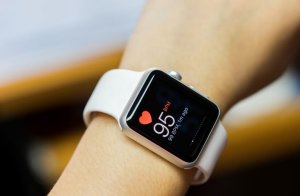Thin, Yet Metabolically Obese At The Same Time?

There’s a false belief that people who are ‘at their right weight’ are healthy… Or that not having an ounce of belly fat is good for our health. However, appearances can often be deceiving, since it is possible that you’re thin and metabolically obese at the same time.
The worst part of it all, is that because we believe we’re already healthy, we don’t workout or go to medical examinations, and the consequences for this can be very serious.
Thinness and obesity at the same time

It’s obvious that these two concepts can be ‘combined’ and even appear together in some people. Understanding how someone can be thin and obese at the same time is a little complicated (it’s a little bit like Schrodinger’s cat, but at a human physical level), and it happens.
It’s possible to have excess fat in our body and still stay within the parameters of our ideal weight in relation to our height, age and physical build. This is known as ‘metabolically obese’ or ‘normal weight obesity‘ and it’s more frequent than we think it is.
The main indicator to determine whether or not a person is overweight is the BMI (body mass index) scale. However, it’s not the most effective way. We can have a normal weight (according to the stipulated parameters of the BMI scale) but a higher concentration of fat in our abdomen.
We can’t only consider a calculation that uses our weight and height, since many other factors define our health levels.
The normal weight scale, yet obese individuals can suffer with the same problems as those who are ‘notoriously overweight’. This includes high blood pressure, insulin resistance, diabetes and increased risk of cardiovascular problems.
We should pay attention to the fat percentage that accumulates in our bodies, since our health problems begin in fatty tissues.
Furthermore, we can’t rely solely on a calculation such as the BMI, because it’s quite a ‘generic’ calculation (although it’s achieved after analysis and comparisons). Therefore, it’s always good to compare more than just one index or chart if we want to determine our physical state.
Skinny fat individuals and their health

Maybe you know someone who can just about eat everything and never gain a single ounce of weight? How can they do it? Well, their supposedly ‘privileged’ metabolism may be hiding a secret: it may be storing fat very close to vital organs. Yes, even if you can’t see fat stores on the ‘outside’, it’s lurking in there, and is responsible for many diseases.
Being thin and metabolically obese is even more dangerous than being overweight in plain sight. Did you know that many people, even people who are below their normal weight, have cholesterol issues? It’s usually related to a high level of triglycerides in the blood and it’s associated with people who have a big belly, but it isn’t always like that.
If someone looks perfect and enviable on the outside, it doesn’t necessarily mean that they’re healthy on the inside. Visceral fat ‘wraps’ around your heart, kidneys, liver and pancreas… Even if you have a flat stomach!
On the contrary, there are metabolically healthy obese people who have low quantities of visceral fat and a greater amount of subcutaneous cellular tissue (the kind of fat that you can actually see).
There are several factors that can cause someone to be thin, but obese at the same time. These include: genetics, stress, sedentary lifestyle -a lack of movement that leads to fat being installed more deeply in the body- and nutrition (certain carbohydrates increase the production of insulin which causes an accumulation of visceral fat).
I am thin and metabolically obese: what do I do?

Even if you consider yourself to be someone that weighs the ‘right amount’ and you’re the envy of your friends and colleagues, or if the ‘only’ bad thing you have is a growing belly, perhaps you should pay more attention to your habits and diet, to avoid silent diseases, like cholesterol problems.
The good news is that you can easily get rid of external fat with exercise and dietary changes. But visceral fat is a bit more complicated to eradicate because we can’t see it. However, doctors can detect it through blood tests and other medical studies.
We recommend that you consume a lot of liquids -mainly water– to promote urine elimination of fat. You can also drink vegetable broths (without fats, salt or meat) and herbal infusions. Drinking lemon or grapefruit juice on an empty stomach can help to detoxify your body and prevent fat accumulation.
Don’t forget that fiber can reduce constipation, Omega 3 can reduce stress and raw vegetables will help to satiate your appetite. Try to say goodbye to candy, fried foods and soft drinks.
There’s a false belief that people who are ‘at their right weight’ are healthy… Or that not having an ounce of belly fat is good for our health. However, appearances can often be deceiving, since it is possible that you’re thin and metabolically obese at the same time.
The worst part of it all, is that because we believe we’re already healthy, we don’t workout or go to medical examinations, and the consequences for this can be very serious.
Thinness and obesity at the same time

It’s obvious that these two concepts can be ‘combined’ and even appear together in some people. Understanding how someone can be thin and obese at the same time is a little complicated (it’s a little bit like Schrodinger’s cat, but at a human physical level), and it happens.
It’s possible to have excess fat in our body and still stay within the parameters of our ideal weight in relation to our height, age and physical build. This is known as ‘metabolically obese’ or ‘normal weight obesity‘ and it’s more frequent than we think it is.
The main indicator to determine whether or not a person is overweight is the BMI (body mass index) scale. However, it’s not the most effective way. We can have a normal weight (according to the stipulated parameters of the BMI scale) but a higher concentration of fat in our abdomen.
We can’t only consider a calculation that uses our weight and height, since many other factors define our health levels.
The normal weight scale, yet obese individuals can suffer with the same problems as those who are ‘notoriously overweight’. This includes high blood pressure, insulin resistance, diabetes and increased risk of cardiovascular problems.
We should pay attention to the fat percentage that accumulates in our bodies, since our health problems begin in fatty tissues.
Furthermore, we can’t rely solely on a calculation such as the BMI, because it’s quite a ‘generic’ calculation (although it’s achieved after analysis and comparisons). Therefore, it’s always good to compare more than just one index or chart if we want to determine our physical state.
Skinny fat individuals and their health

Maybe you know someone who can just about eat everything and never gain a single ounce of weight? How can they do it? Well, their supposedly ‘privileged’ metabolism may be hiding a secret: it may be storing fat very close to vital organs. Yes, even if you can’t see fat stores on the ‘outside’, it’s lurking in there, and is responsible for many diseases.
Being thin and metabolically obese is even more dangerous than being overweight in plain sight. Did you know that many people, even people who are below their normal weight, have cholesterol issues? It’s usually related to a high level of triglycerides in the blood and it’s associated with people who have a big belly, but it isn’t always like that.
If someone looks perfect and enviable on the outside, it doesn’t necessarily mean that they’re healthy on the inside. Visceral fat ‘wraps’ around your heart, kidneys, liver and pancreas… Even if you have a flat stomach!
On the contrary, there are metabolically healthy obese people who have low quantities of visceral fat and a greater amount of subcutaneous cellular tissue (the kind of fat that you can actually see).
There are several factors that can cause someone to be thin, but obese at the same time. These include: genetics, stress, sedentary lifestyle -a lack of movement that leads to fat being installed more deeply in the body- and nutrition (certain carbohydrates increase the production of insulin which causes an accumulation of visceral fat).
I am thin and metabolically obese: what do I do?

Even if you consider yourself to be someone that weighs the ‘right amount’ and you’re the envy of your friends and colleagues, or if the ‘only’ bad thing you have is a growing belly, perhaps you should pay more attention to your habits and diet, to avoid silent diseases, like cholesterol problems.
The good news is that you can easily get rid of external fat with exercise and dietary changes. But visceral fat is a bit more complicated to eradicate because we can’t see it. However, doctors can detect it through blood tests and other medical studies.
We recommend that you consume a lot of liquids -mainly water– to promote urine elimination of fat. You can also drink vegetable broths (without fats, salt or meat) and herbal infusions. Drinking lemon or grapefruit juice on an empty stomach can help to detoxify your body and prevent fat accumulation.
Don’t forget that fiber can reduce constipation, Omega 3 can reduce stress and raw vegetables will help to satiate your appetite. Try to say goodbye to candy, fried foods and soft drinks.
This text is provided for informational purposes only and does not replace consultation with a professional. If in doubt, consult your specialist.








